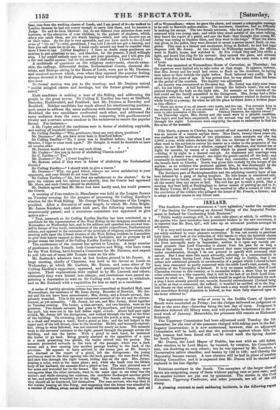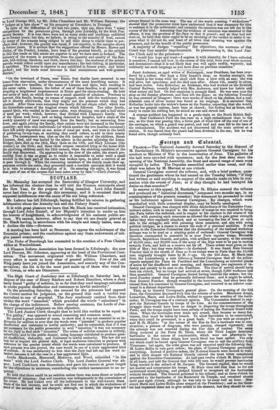IRELAND.
The Southern Reporter announces a "new agitation," under the auspices of " the Society for Promoting an Annual Sitting of the Imperial Parlia- ment in Ireland for Conducting Irish Business." " Public weekly meetings will, it is said, take place; at which, in addition to the parties who have heretofore been prominent leaders in the new movement, it is reported that Mr. Butt, Q.C., will take up an advanced position amongst its advocates.
" It is very well known that the interchange of political visitations of late are not solely confined to mere pleasure excursions. It was not merely to purchase baby linen, and look at the collection of wild beasts in what the humbler classes of Dublin commonly call the "Logical Gardens,' that the British Premier visited the Irish metropolis early in September; neither is it upon any merely per- sonal grounds that Lord Clarendon is absent from his post for so long a time at this period. You may be well assured that some important changes are under consideration, though I do not pretend to specify with accuracy their nature. But I may state this much advisedly, referring to a communication in one of my letters during Lord John Russell's brief stay in Dublin, that I can collect now additional grounds in corroboration of a project which I stated to have been then rumoured as partly connected with the noble Lord's visit, namely, the abolition of the Viceroyalty in Ireland. It is by no means unlikely, that if Lord Clarendon returns to this country, or is succeeded within a short time by some other nobleman in a like capacity, that it will be the last of an Irish Lord-Liete, tenant we shall see. The grounds which would be urged in Parliament for such a step I have already pointed out, namely, financial retrenchment (Ireland being in so far as that is concerned, the sufferer, it wouldn't be cavilled at in the Eng- lish Senate on that score); and next, that such a step would tend to centralize and consolidate British dominion in Ireland, as was more fully observed upon in the letter referred to."
The arguments on the writs of error in the Dublin Court of Queen's Bench were concluded on Friday; but the Judges delivered no judgment on that or the next day—Saturday being the last day of term. Judgment is therefore deferred till Hilary term, and will probably be delivered in the se- cond week of January. Meanwhile, the prisoners will remain at Richmond Bridewell.
The Tipperary Commission had been adjourned until Tuesday the 5th December, for the trial of the peasants charged with taking part in the Bal- lingarry insurrection: it is now understood, however, that no adjourned Commission will be held, and that the prisoners against whom bills for high treason had been found will not be tried until the Spring Assizes for South Tipperary. Mr. Dunne, the Lord Mayor of Dublin, has met with an odd defeat. After election to be Lord Mayor, he vacated, by rotation, his Councillor's seat, not doubting an easy return; but he was opposed by Mr. Lambert, a Conservative tallow chandler, and beaten by 122 to 108; and thereby the Mayoralty became vacant. A new election will be had in place of another retiring Councillor, and it is expected that Mr. Dance will be elected and replaced in his lost dignity.
Evictions continue in the South. The occupiers of' the larger class of farms are emigrating, many of them without paying rent or poor-rate; and the smaller holders are put out by ejectment. The stories in the Cork Examiner, Tipperary Vindicator, and other journals, are all of the old stamp. A pleasing contrast to such saddening incidents, is the following report to Lord George Hill, by Mr. John Chambers and Mr. William Ramsay, the " judges at a late show " on his property at Gweedore, in Donegal.
In spite of the difficulties of the last two years, they say, there were " many competitors for the premiums given, through your Lordship, by the Irish Pea- santry Society. It is true there were not so many socks and stockings exhibited as in-former years; but this, we believe, is owing to the scarcity of wool, caused by many of the tenants being obliged to sell their sheep to enable them to pur- chase food: however, the quality was equal, if not superior, to the samples shown in former years. It is evident that the suggestions offered by Messrs. Hawes and Ottley, of the Poultry, London, have been of the greatest benefit, as the articles in this line made on this estate are superior to any we have seen in Ireland. The industry of the women is perceptible, from the quantity and quality of the flan- nels, bed-ticking, blankets, and cloth, shown this day: the neatness of the several parcels would reflect credit upon any manufactory; the bed-ticking, in particular, is excellent. The butter is superior to any exhibited in former years, and better packed; and the trade mast increase in that mountainous and well-grassed district " "On the townland of Doors, near Enuis, four deaths have occurred in one house from starvation, under circumstances of the most horrifying nature. It appears that two families, of the name of Linnane and Quin, were residing in the same cabin. Linnane, the father of one of these families, is at present un- dergoing a lengthened imprisonment in Ennis gaol for sheep-stealing. He held two acres of land, on which there was a small quantity of potatoes. Previous to harvest, this family, having no means of support, went into the workhouse; but left it shortly afterwards, that they might use the potatoes which they had planted. After these were consumed the family did not obtain relief; which was the immediate cause of the tragical events which followed. The other family, named Quin, who resided in the same cabin, were obtaining one-and-a-half stone of meal per week; which, however, they divided with Lmnane's family. One of the Quins took fever; and on being removed to hospital, half a stone of the weekly quantity of meal was stopped from the family; but on recovering from fever, and again joining the family, their rations were not increased to the former quantity; and thus nine individuals (of which number the two families consisted) were left solely dependent on one stone of meal per week, and were in the habit of gathering turnip-tops, or anything they could collect, to add to their scanty fare. The consequence was, that on the 6th instant one of the children, Susan Linnane, died, and was buried by the others in the garden adjoining the house. Bridget Quin died on the 16th, Mary Quin on the 19th, and Mary Lmnane (the mother) on the 20th; and these three corpses remained lying in the house with the surviving children until the 24th instant, when the shocking condition of the family was discovered. On approaching to the door of the cabin, the stench pro- ceeding from it was so great as to render it impossible to enter until a small window in the back part of the cabin was broken open, to allow a current of air to pass through it. When the remaining members of the family made their ap- ?aranee outside the cabin, they presented such a horrible spectacle that it would be in vain to attempt a description of it. On entering the cabin, it was found that part of one of the corpses had been eaten away by rats."—Clare Journal.



























 Previous page
Previous page